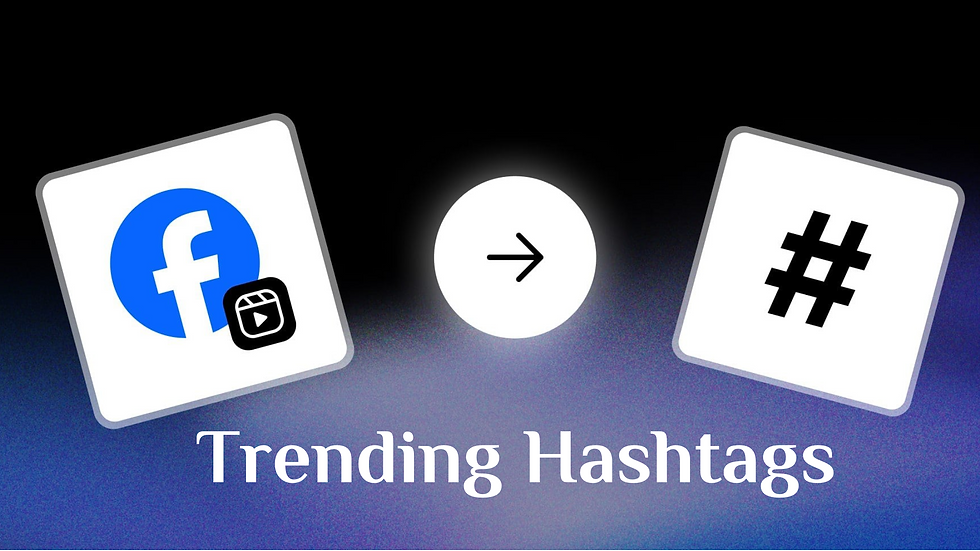The Ultimate Facebook Hashtags Handbook
- maximofar02
- Mar 13, 2025
- 4 min read
Hashtags have become an integral part of social media, helping users discover content, increase engagement, and reach a broader audience. While platforms like Instagram and Twitter are often associated with hashtags, Facebook has gradually embraced them as well.
When used strategically, they can improve content visibility and enhance marketing efforts.
In this guide, we’ll explore everything you need to know about Facebook hashtags, from their importance to the best ways to use them effectively.
The Power of Hashtags on Facebook
Unlike other social media networks, Facebook's hashtag feature works slightly differently. Hashtags help to organize and search material, but they don't necessarily produce as much engagement as Twitter or Instagram.
However, when utilized properly, hashtags can still increase post reach, interactions, and content discoverability. Facebook's algorithm uses hashtags to connect relevant postings, making it easier for users to identify discussions and topics of interest. Brands, influencers, and enterprises may use hashtags to participate in popular conversations, reach specific audiences, and increase their online presence.
How to Use Hashtags Effectively
Using hashtags on Facebook isn’t just about adding a random string of words to your posts. It requires a strategic approach to ensure they contribute to engagement rather than cluttering the content. Here are a few best practices:
1. Choose Relevant Hashtags
Hashtags should be relevant to the content you’re posting. If you’re sharing a marketing tip, using unrelated hashtags about travel or fitness won’t help. Instead, focus on hashtags that align with your niche like #SocialMediaMarketing, ensuring your content reaches the right audience.
2. Keep It Short and Clear
Unlike Instagram, where longer hashtags might trend, Facebook users prefer concise and clear hashtags. Short hashtags are easier to read and remember, making them more effective.
3. Limit the Number of Hashtags
While some platforms encourage using multiple hashtags, Facebook users engage better with posts that use fewer, well-targeted hashtags. Studies suggest that using one to three hashtags per post yields the best results. Overloading a post with hashtags can make it look spammy and reduce engagement.
4. Research Trending Hashtags
Trending hashtags on Facebook change frequently, and using them strategically can boost visibility. Checking what’s trending in your industry helps you join popular conversations while keeping your content relevant.
5. Create Branded Hashtags
Many brands create their own unique hashtags to encourage user engagement. These branded hashtags help build community interaction and make it easier for customers to find related content.
Types of Hashtags That Work Best
Not all hashtags perform equally. Some are more effective in driving engagement and improving reach. Here are a few categories that tend to work well:
1. Industry-Specific Hashtags
These hashtags relate to a specific industry and help users find niche content. For example, digital marketers might use #SocialMediaMarketing, while fitness brands may use #HealthyLiving.
2. Trending Hashtags
Using trending hashtags on Facebook can put your content in front of a larger audience. However, it’s important to ensure that the trend aligns with your content. Jumping on irrelevant trends can appear forced and inauthentic.
3. Campaign Hashtags
Brands often create campaign-specific hashtags to promote events, launches, or seasonal campaigns. These hashtags encourage user participation and make tracking engagement easier.
4. Community Hashtags
Some hashtags are widely used by specific online communities. For instance, #MomsWhoBlog or #TechEnthusiasts can help you connect with like-minded individuals.
5. Location-Based Hashtags
Businesses targeting local audiences can benefit from location-based hashtags such as #NYCFoodies or #LondonEvents. These make it easier for users in a particular area to discover relevant content.
The Role of Automation in Hashtag Strategy
Managing and tracking hashtags can be time-consuming, but leveraging Facebook automation tools can simplify the process. These tools help schedule posts with predefined hashtags, analyze performance, and identify the best hashtags to use for maximum engagement.
Automation tools can also monitor hashtag trends, allowing businesses to stay ahead of competitors. By integrating automation into your social media strategy, you can ensure consistent hashtag usage without the manual effort.
Mistakes to Avoid When Using Hashtags
While hashtags are beneficial, they can backfire if misused. Here are some common mistakes to avoid:
Overloading posts with hashtags – Too many hashtags can make the content look cluttered and reduce engagement.
Using irrelevant hashtags – Hashtags that don’t align with the post’s content can confuse users and weaken credibility.
Ignoring analytics – Regularly reviewing hashtag performance helps identify what works and what doesn’t.
Not updating hashtags – Using outdated hashtags won’t yield results. Stay updated with current trends.
You can also watch : Socinator| All-in-One Social Media Management Platform
Conclusion
Hashtags on Facebook may not be as popular as they are on Instagram or Twitter, but they remain an important part of content strategy. When used effectively, they may boost visibility, and interaction, and help build a stronger online presence.
Businesses and content creators may increase their reach and effect by using the best Facebook hashtags, tracking trends, and employing automation. A well-thought-out hashtag strategy can significantly impact how content is discovered and interacted with on the network.




Comments